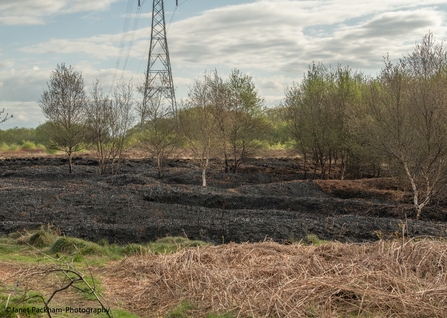
A Lancashire Wildlife Trust nature reserve after fire © Janet Packham

A Lancashire Wildlife Trust nature reserve after fire © Janet Packham
A prolonged spell without rain means many heathlands, moorlands and grasslands are ‘tinder dry’, catching fire from the tiniest hot ember or spark. Recent wildfires in Surrey, Yorkshire, Lancashire, Dorset and Teeside have left land scorched and nature without a home.
The Wildlife Trusts are asking visitors to the countryside to:
Joe Murphy, Senior Nature Reserves Officer at Cumbria Wildlife Trust, said: “While we’ve had some wet weather recently, overall we had an incredibly dry spring here in Cumbria, meaning that parts of the countryside have become a tinder box. Before new, green growth becomes established, the dead remains of last year’s growth can be very susceptible to catching fire. Bracken, heathland, bogs and reed beds are especially vulnerable, as has been shown by a number of nature reserves that have burnt this spring. People need to be especially vigilant at reporting any fires and make sure that BBQs and fires are only made in designated places.”
Joe pointed out that none of Cumbria Wildlife Trust’s Nature Reserves are designated places for barbeques or campfires.
Rob Stoneman, Director of Landscape Recovery at The Wildlife Trusts said: “We are in a climate and nature emergency. Our landscapes are under more pressure than ever before as temperatures rise and changing weather patterns mean they are more susceptible to wildfires. A BBQ or stray cigarette may set light to a much-loved beauty spot leading to destruction that takes decades to repair.”
“Too often a care-free day out can turn into tragedy when wildlife and precious habitat are devastated by wildfires caused by careless behaviour. We want everyone to enjoy our wonderful wild places – please join us in taking care of them and acting responsibly.”
Lapwing, curlew, snipe and sundew plants were feared to have been caught in fires at two Lancashire Wildlife Trust reserves recently – and vital equipment used to help nature restoration was also damaged. A blaze at Yorkshire Wildlife Trust’s Potteric Carr nature reserve burnt just over six acres of reedbed with nesting ducks and chicks.
A huge wildfire at Dorset’s largest lowland heath, Canford Heath, a Site of Special Scientific Interest, killed ground nesting birds, lizards and smooth snakes. In Teeside a moorland fire affected birds and deer; in Northumberland fire crews had to use water from a nearby lough to put out a forest blaze.
The Wildlife Trusts welcome a recently commissioned Government review into the involvement of disposable barbecues in wildfires.